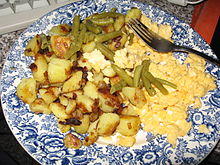Ovo vegetarianism /ˈoʊvoʊ/ is a type of vegetarianism which allows for the consumption of eggs but not dairy products, in contrast with lacto vegetarianism. Those who practice ovo vegetarianism are called ovo-vegetarians. "Ovo" comes from the Latin word for egg.
Motivations
Ethical motivations for excluding dairy products are based on issues with the industrial practices behind the production of milk. Concerns include the practice of keeping a cow constantly pregnant in order for her to lactate and the slaughter of unwanted male calves. Other concerns include the standard practice of separating the mother from her calf and denying the calf its natural source of milk.[1] This contrasts with the industrial practices surrounding egg-laying hens, which produce eggs for human consumption without being fertilized. Ovo-vegetarians often prefer free-range eggs, that is, those produced by uncaged hens.[2] Many ovo-vegetarians refuse to eat fertilized eggs, with balut being an extreme example where the egg has developed.
Some vegetarians are lactose intolerant and have a casein allergy, and are therefore unwilling to consume milk or other dairy products.
Carbon emissions associated with keeping hens are less than those associated with cattle, a factor significant to those practicing environmental vegetarianism.
Concerns
Ethical concerns about the consumption of eggs arise from the practice of culling male chicks shortly after birth.[2][3][4] Practices considered humane for chick culling include maceration and suffocation using carbon dioxide.[2][5]
One of the main differences between a vegan and an ovo-vegetarian diet is the avoidance of eggs. Vegans do not consume eggs under any circumstances.[6]
See also
- Lacto vegetarianism
- List of diets
- List of dairy products
- List of vegetable dishes
- List of vegetarian restaurants
- List of egg dishes
- Ovo-lacto vegetarianism
References
- ^ The Dairy Cow from the website of the Vegan Society
- ^ a b c Hens & Eggs from the website of the Vegan Society
- ^ Day 20: Hard Boiled, Deviled & Devastated Archived 2011-07-19 at the Wayback Machine, a January 26, 2008 blog post from a Loma Linda University Adventist Health Sciences Center blog
- ^ Vegetarian Society. "Laying hens" subheading: "Egg Production & Welfare".
- ^ "Maceration" (PDF). AVMA Guidelines on Euthanasia. American Veterinary Medical Association. June 2007. Archived from the original (PDF) on 2011-08-15.
A review of the use of commercially available macerators for euthanasia of chicks, poults, and pipped eggs indicates that death by maceration in day-old poultry occurs immediately with minimal pain and distress. Maceration is an alternative to the use of carbon dioxide for euthanasia of day-old poultry. Maceration is believed to be equivalent to cervical dislocation and cranial compression as to time element, and is considered to be an acceptable means of euthanasia for newly hatched poultry by the Federation of Animal Science Societies, Agriculture Canada, World Organization for Animal Health (OIE), and European Union.
- ^ Erik Marcus (2000). Vegan: The New Ethics of Eating. ISBN 9781590133446.
